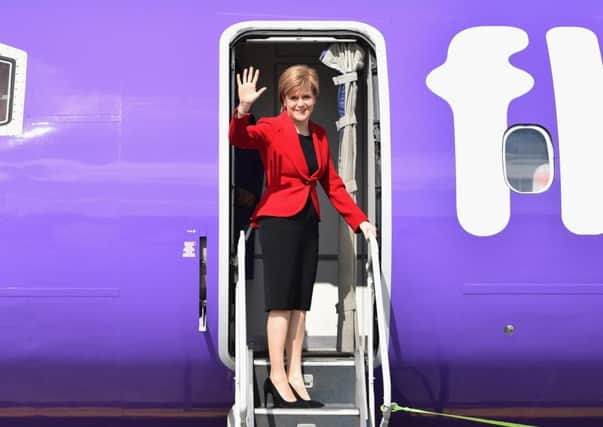Leader: Aftershocks to come for Scottish politics


The remarkable rise in the fortunes of the SNP, which really properly began in 2007 when it first formed the Scottish Government and was given added momentum by its majority win in 2011, shows no sign of abating, in fact it seems to grow from strength to strength. Yesterday, it took 50 per cent of the vote. It has 56 of Scotland’s 59 MPs, the other parties with just one each. Scotland is a different country.
Just a year ago it would have been unthinkable that Scotland would have just one Labour MP. This is the party that for decades was the dominant force, the party of the worker, the party of social justice and equality in a nation that held those values dear. Now Labour has seen its domination reversed. Scottish Labour sleep-walked in to this disaster over many years, failing to see the dangers because it believed itself invincible and its power inevitable. Even the wake-up calls of 2007 and 2011 went unheeded and it used up all its energies in acrimonious in-fighting. Last night it got what was coming. Jim Murphy probably ran as good a campaign as he could have, but even before he took on the job it was all over. To learn from the mistakes the party made in the past he must now leave the post and hand on to the next generation if the party stands any chance of rebuilding itself. It is not enough to say that he was given a duff UK leader and a leadership that really showed no interest in Scotland, even though that is true.
Advertisement
Hide AdAdvertisement
Hide AdLet’s be clear that Labour’s failure in Scotland probably caused the tremors that brought the UK party to failure and the resignation of its leader. Allowing the SNP to take so many of its seats gave the party a very practical disadvantage when it came to the Westminster arithmetic. It is worth taking a moment here to reflect on the strength of disaffection indicated by the fact that many former Labour supporters preferred the risk of a Tory government to backing their former party.
But that was not Scotland’s only gift to David Cameron, or probably even its greatest gift. Even if Labour had taken every Scottish seat it would still have finished 41 seats behind the Tories. As well as taking away Labour MPs the prospect of a Labour government being propped up by SNP MPs gave Mr Cameron probably his most powerful weapon on the doorsteps of England. This galvanised Tories to turn out, prompted tactical voting to their advantage (largely at the expense of the Lib Dems) and stopped would-be defectors to Ukip. Mr Cameron unashamedly played on this fear.
Scotland’s political life has been dominated almost to the exclusion of all else by the constitutional question for the past three years. That same question formed a huge part of this election campaign, and was probably the deciding factor in the result. And now it looks as if it is set to continue as the prism through which every issue is seen. For instance, the issue that will dominate in the rest of the UK following Mr Cameron’s election is likely to be his promised referendum on membership of the European Union. But that has already been turned into a different Scottish issue by a suggestion that a UK referendum result that was for leaving the EU would legitimately trigger another independence referendum in Scotland. Mr Cameron has seen the difficulty ahead of him if his speech after seeing the Queen yesterday is anything to go by. He said he wanted to make Scotland “the strongest devolved government anywhere in the world”. He also signalled more potential clashes with the large SNP contingent by adding that the settlement would also have to be fair to England, and there is already disagreement over which measures affect England only.
Nicola Sturgeon’s entire campaign was that Scotland’s best interests lay in giving the country a strong voice in Westminster, and the more SNP MPs the stronger it would be. But now there is a potential problem here. Mr Cameron has a majority, and it doesn’t matter how loudly the SNP MPs shout, they have no practical way of influencing the decisions that come out of Westminster. That may be why Ms Sturgeon said that Westminster “can’t ignore” Scotland and why Alex Salmond said that Scotland would roar “with a voice that no government is going to be able to ignore”.
The fact is that Mr Cameron could choose to ignore those loud voices, in fact it might be tempting for him to do so, but he must not. Firstly because those MPs are the democratically elected representatives of the people of Scotland, and that has to be respected.
But mostly because denial of that voice or respecting of those wishes would create division that would be exploited and lead inevitably to calls very shortly for a second referendum. And if listening to those voices means he accedes to full fiscal responsibility, then so be it. Aftershocks are going to be felt in many places for a long time to come.